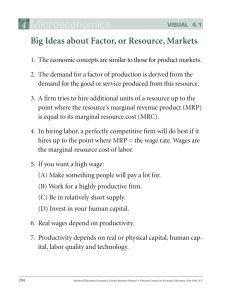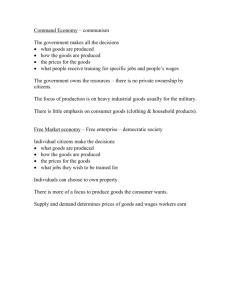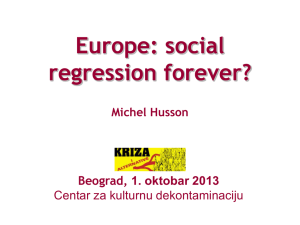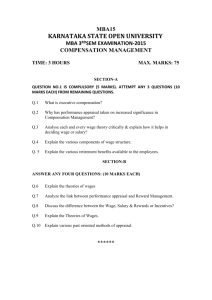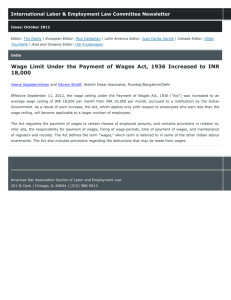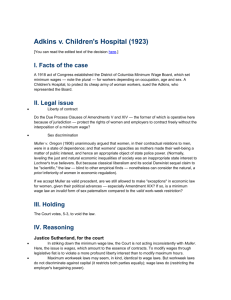Competitiveness Pact, European Economic Governance and Wages
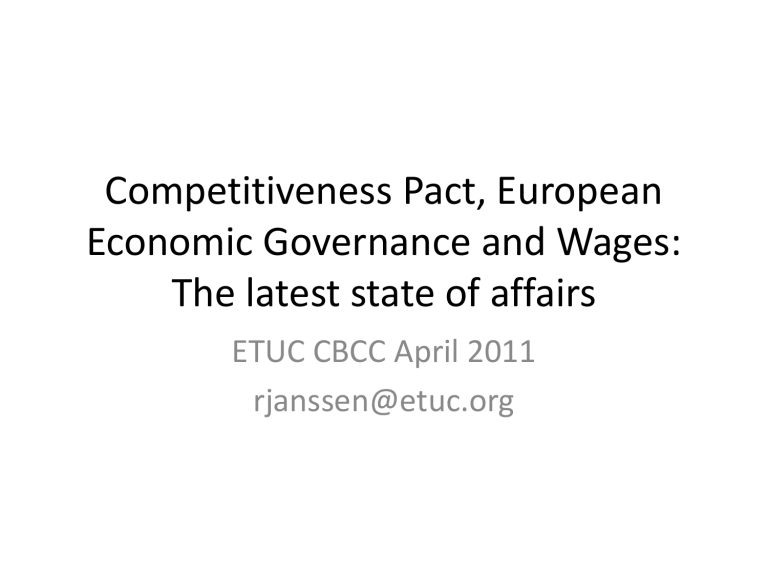
Competitiveness Pact, European
Economic Governance and Wages:
The latest state of affairs
ETUC CBCC April 2011 rjanssen@etuc.org
The Euro Plus Pact
• A Pact for Competitiveness and Convergence
• Does it ring a bell ?
• Co signed by BG,DK,LV,LT,POL,RO
• Competitiveness, Jobs, sustainability of public finances, financial stability
Wages in the Competitiveness Pact
• Some progress:
– Respect national traditions of social dialogue and social partners relations
– Preserve social partner’s autonomy in collective bargaining
– Involve social partners through Tri partite Summit
– Recognition of fact that this concerns national
(hence not European) competences
– Each member state decides on specific measures
Wages in the Competitiveness Pact
• At the same time, the Pact continues to sets clear norms and standards for wages…
– Wage dynamics in line with productivity growth
– Wage dynamics in line with productivity growth plus adjusting for competitiveness
– Relative unit wage costs comparisons
– It’s’a symmetrical’: It’s about ‘large and sustained’ wage increases that may erode competiteveness
(growing current account deficit, falling export market shares)
Wages in the Competitiveness Pact
• …as well as the method to reach it
– Re examine wage setting machinery
– Degree of centralisation of collective bargaining
– Indexation mechanisms
– Use public sector wages as a signal to private sector wages
Increasing productivity instead of cutting wages?
• Open up sectors protected from competition
( professional services, retail,…)
• Education, R and D
• Labour market reforms (‘flexicurity’)
European Economic Governance
• Focus on ‘excessive macro economic’ imbalances
• New version of Commission text: « The alert mechanism » (16 the March)
• Recall: Alert mechanism consists of
– Scoreboard with limited indicators
– Thresholds, based on purely statistical ‘quartiles »
– In depth analysis: « Economic judgment »
New proposals for indicators
• Unit labour cost: 3 year percentage change with a threshold of 9% for Euro Area (12% for non euro area)
• Export market shares: Exports of goods and services in current prices as share of world exports. Five year change
Table of indicators alert mechanism
ETUC evaluation
• Competitiveness Pact : Setting Germany’s wage depression as an example for the rest of
Europe to follow
• Wages to equal productivity…
The German example/miracle
Unit wage costs 2000 = 100
25
20
15
10
5
0
2000 2001 2002 2003 2004 2005 2006 2007 2008 2009 2010
-5
Germany
Price Stability line
Adjusting for competitive positions and relative wage comparisons.
ETUC evaluation (continued)
• « Relative » wage comparisons (mainly) within the European integrated marketplace are dangerous and perverse
• This is pushing the ‘wage race to the bottom’; providing an official excuse for it.
• Today’s wage depression in one part of Europe risks becoming tommorow’s wage depression in another part of Europe.
• No ‘floor’, no downwards limits to relative wage comparisons and wage adjustments.
Taking over the logic of the Euro
Competitiveness Pact
• Governance of wages now becomes clearly ‘a symmetrical’
• Previous proposal: REER indicator:
Complicated but somehow, somewhat symmetrical (+4/-4%)
• Now: Nominal Unit Labour Cost; Three year average; Threshold: 9% for Euro Area (12% for others). Longer periods (5 to 10 years could be taken)
Nominal ULC’s
What’s wrong with 9%?
• Conspicuously close to ‘2% price stability plus productivity’ ! (which may not be so bad)
• Nothing, absolutely nothing on MS menacing price stability from below
• -9% threshold: Not clear whether Commission proposes this. Makes no sense anyway as
‘signal’ would only be delivered from moment nominal wages are cut by 6 to 8% (assuming productivity increase of 1 or 2%)
Another nuance
• Commission’s note tries to get out from under
‘relative’ wage comparisons as suggested by the Pact..
• … but unlikely to keep this up (‘how national
ULC’s will develop in relation to other euro area members will be…???)
Export market shares
• A systematic negative biais in the evaluation of higher income countries
• Essence of globalisation: Falling share of an increasing pie
• An increasing share of an increasing pie even better (Germany): But this depends on structural competitiveness factors, certainly not wages.
• Note : No upper threshold (vis à vis EU members)
Export market shares
ETUC strategy: In the short run
• Looking to weigh in on the European Parliament
• ECON vote 19 the April, Plenary in June, Joint
Parliament/Council decision end of June
• Restating our priorities:
– Clauses to safeguard wages
– Symmetrical application
– Rebalance with social issues, role of social dialogue
– Balanced fiscal consolidation
Clauses to safeguard wages
• Implicit and explicit reference to horizontal social clauses
• « Recommendations shall not encroach on wages on which Europe has no competence »
• Scrapping any reference to wage policy
• No sanctions related to wage recommendations
• Language, already in EMPLOYMENT opinion (P.
Bérès)
Re mobilize internal coordination
• « ETUC » coordinating with affiliates to stage an acceleration of wage dynamics in ‘surplus’ countries…
• … being « reflected » in ‘deficit’ countries
• … provided the following conditions are observed:
– Politicians, central bankers keep their hands of wages
– No wage cuts or wage freezes
– Strictly « internal » coordination: It’s’our’ business
HOW DOES THE CBCC PREPARE? ARE AFFILIATES
WILLING? ARE POLICY MAKERS LISTENING?
Relying on our on own strengths (CPC)
• Close ranks, support each other
• Expose a mistaken policy
• Expose breaches on the Treaty (autonomy of
CB)
• Upgrade our existing strategy of coordination
– Common demands
– Common actions
– Together with industry federations
A « European » labour market (CPC)
• Not realistic to insulate national CB systems from
European pressure
• Therefore, a more « European » approach with common and minimum standards
• Universal right to bargain at national and EU level
– Minimum pay
– Fair share of productivity increase
– Regulate work hours
– Equality
– Information and consultation
• Social dialogue machinery in each MS plus report to
European conference on labour standards
Meanwhile, another new but old challenge for wages
• Rising headline inflation and second round effects
• ECB will raise interest rates
• Internalising this constraint as well ?
Behind appearances: The ECB’s real concern
• If ( a big if) wage dynamics in the ‘core’ really do accelerate …
• …this will also push inflation in the core higher…
• … hence, higher euro area average inflation
• A higher single interest rate…
• …will not tame upwards inflation drift in the core; keeping real interest rates low so that the financial boom can continue…
• … while representing a disaster for the periphery
History repeats itself …. now the other way around


